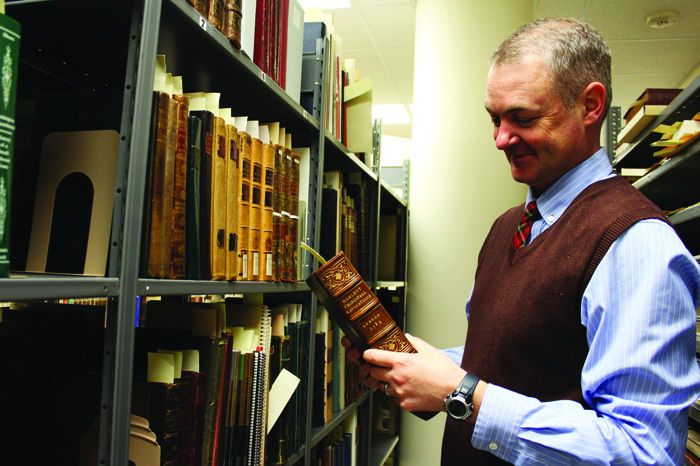Life in the stacks
Trevor Bond, head of WSU Manuscripts and Special Collections, looks at Principal Navigations. The book, published in 1589, is one of Bond’s favorites and is said to have inspired Shakespeare.
November 20, 2013
Behind the papyrus fragments dating to 300 B.C. and the books from the late 1400s, there is a man whose dedication to the written word and the histories they reflect can be seen in his everyday life.
Trevor Bond is the head of the WSU Library’s Manuscripts, Archives and Special Collections (MASC) and the books in the WSU archives are an integral part of his passion.
For 15 years Bond has served at the WSU libraries, but his path to the archives almost didn’t happen.
“I thought at the time (library science) books were kind of boring,” Bond said. “I thought I was going to be a Roman historian, (but) when I switched to the program at UCLA on libraries and archives, all of a sudden I had all these great opportunities.”
Bond originally studied Greek and Roman history, later getting into archives during his years as a graduate student.
“I just really found that I love old books, manuscript collections,” Bond said. “I’m really grateful I kind of found my way into it. It wasn’t something I planned as a kid, but it was something I kind of fell into.”
Some of Bond’s favorite items at MASC include an English book from the late 1500s, Principal Navigations, which detailed travels and reportedly inspired Shakespeare.
But he also loves “yellow-backs,” the “trashy novels of the 19th Century.”
One of the characteristics that make individual libraries unique is their special collections, Bond said. At WSU, MASC is unique for its extensive veterinary science collection and the 9,000 books that once belonged to author Virginia Woolf.
Much of the collection is donated by individuals, but Bond also buys works to enhance WSU’s collection. They recently acquired pictures of Heart Mountain, a Japanese internment camp, which existed during WWII, and also collect items relating to the Colville and Nez Perce Native American reservations.
They also provide many of the old campus photos and posters seen around town, such as at The Bookie or Starbucks.
MASC is working on digitizing its collection, which includes copies of The Daily Evergreen from 1890 to the 1960s. There are still 35,000 boxes of various books to scan in, Bond said.
“We’re just beginning to scratch the surface,” he said. “Libraries are evolving like most institutions. We’re not the institutions that we were 10 years ago.”
In his 15 years at WSU, Bond has seen the libraries change, but views the Internet as an ally rather than a competitor in a librarian’s mission.
“It’s really a great gateway to our collections, and I think the Internet has opened up research to people who never conducted research before,” he said. “So having a presence out there and having thousands and thousands of pages of information about our collections available online has really opened the doorway to a research repository like this.”
While many people find MASC through a Google search, Bond said physical libraries still have a place. Many collections are not available online, so research has to be done in person. Also, students still need a quiet place to study or collaborate, he said.
“The libraries are really here to help students be successful at WSU,” he said. “Don’t be afraid to go up to the reference desk and ask a question or get some help. Likewise, all students are welcome to look at anything we have in our department.”
WSU is working on sharing its Griffin Catalog with other universities across the Northwest.
“If you need a book and we don’t have it here, a student at University of Oregon or Western Washington will pull it off their shelf, put it in a courier bag, and it’s here – no charge to you – in a couple of days,” Bond said. “Stuff like that is pretty glorious.”
In addition to working with the MASC, collaborating with other universities, helping researchers from around the world with questions about WSU’s collections, writing grant reports, and attending academic conferences, Bond also teaches a history class each semester.
Librarians at WSU have faculty status and are tenure-tracked.
The challenge of his job is there’s always work to be done, and he said he juggles many projects and events. But that can also be seen as a positive, Bond said.
“The thing I really like is, every day is different and unexpected,” Bond said.





















